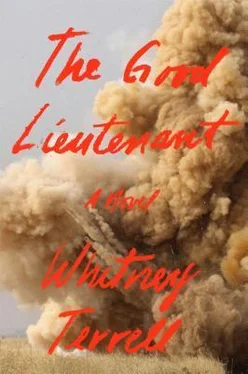Turning, she gave Pulowski the stink-eye. He reacted like a Broadway singer, eyes bugged, hands flapping as if he’d thought that inviting Beale would be a good thing. Which, four weeks ago, would’ve been the case.
“Why would I apologize?” McKutcheon said. “I have no idea. Maybe I just figure we’ll screw something up here eventually.”
“Like Frenchy here?” Beale asked, staring at the TV. On it, Lance Armstrong pedaled through a mountain meadow in France, his shadow racing out in front of him.
“He’s an American,” McKutcheon said.
“Really?” Beale said, squinting. “Well, there’s your answer. I’d damn sure apologize if I got caught riding around France in a yellow shirt.”
“I don’t think he intends to get caught,” the major continued smoothly. “Speaking of which, I understand you’ve been having some trouble with the colonel.”
“Who told you that?” Fowler asked warily.
“ My understanding,” Beale said, “is that the lieutenant and the colonel have a hell of a good relationship when it comes to covering each other’s ass.”
“Did I say that this has anything to do with covering the colonel’s ass?” asked McKutcheon, who was either entirely oblivious to the tension or experienced enough to ignore it. He picked up a stack of xeroxes and waved them in the air. “As the chief information officer for the First Battalion, Twenty-seventh Infantry, I would neither confirm nor deny such a thing.”
The A’am al-Bina’a newsletter, which McKutcheon handed out, was a battalion publication, printed in Arabic and English, publicizing the improvements that Colonel Seacourt had brought to their AO. Fowler was relieved for the break. They were on the verge of what felt to her like almost total anarchy. The three of them — Beale, herself, and Pulowski — all at odds, all resentful, all bitter. The only person who knew why they all felt that way was her. As for the newsletter, it described exactly the kind of reconstruction work that Colonel Seacourt had promised the battalion would do when Fowler’s platoon had been training at Fort Riley: COALITION REBUILDS SALMAN PAK ELEMENTARY, WATER PLANT REPAIRS PLANNED FOR MUSAYYIB, BAGHDAD IS BEAUTIFUL PROGRAM A SUCCESS. Beale laughed, a stringy, surprisingly cynical yip. “Jesus Christ,” he said. “Who writes this? Captain Kangaroo?”
“The question is, is this better than what you’ve been doing?” Pulowski asked. He’d hunched into the crate by now, leaning in the doorway, lanky and poorly shaved.
This was dangerous territory around Pulowski, the closest they’d come to the subject they’d argued about before he left. “Look, I’m for rebuilding some kid’s school,” she said. “I just don’t see what that has to do with me and Beale.”
“The main problem with the Salman Pak school,” McKutcheon said, “is that it has since been blown to smithereens.”
“All right, then, what about the Musayyib Water Treatment Plant?”
“Also blown up,” Pulowski said. Then in the scalloped profile of his face, lit by the slate blue of the Mac screen, she saw a twinge of uncertainty, as if he’d answered too quickly. “Wasn’t it?” he said to McKutcheon.
“Read that one, Lieutenant,” McKutcheon said to her, dropping his earlier politeness. There was a bit of the geek tyrant in his demand, generous to sycophants, but vain as Napoleon with his equals or better, Fowler would’ve bet. Women especially.
She could also tell by McKutcheon’s tone how this was going to go. Disaster following disaster. Not one word accurate on its face. What surprised her was that Pulowski and McKutcheon still saw her as the kind of officer who would be shocked that Colonel Seacourt would put his name on this kind of transparent crap. “‘The Musayyib Water Treatment Plant in Babil Province is currently pumping water directly from the Euphrates River into the city’s drinking water system with little or no filtration,’” she read aloud. “‘This type of treatment was insufficient for fully treating raw river water.’”
“Ya think?” Pulowski said. There was a forced pleasure in his voice.
“‘The coalition recognizes that operations and maintenance of public infrastructure is one of Iraq’s biggest challenges,’” Fowler continued.
“Translation,” McKutcheon said, still sounding like Thurston Howell III. “The last two foremen on this project had their heads cut off and their bodies dumped into the main … thingy, whatever it is. The place where the water would be going. Reservoir?”
Pulowski sat on the floor with his legs stretched out in front of him, looking about as cynical and blank as McKutcheon. Except for the brief burst of nerves that she’d seen flash across his face when she’d first shown up for their meeting, she hadn’t been able to get a read on his intentions. Was he trying to humiliate her? Or did she just feel that way? “I don’t know about you guys,” she said, “but this sure cheers me up.”
“I wanted you to know the risks,” Pulowski said.
Beale made a fart sound. Which Fowler appreciated, mightily.
“The risks of what?” she asked.
“The cameras I’ve been working on are designed to prevent stuff like this. Give us a chance to monitor sensitive areas and projects outside the wire,” Pulowski said. “The colonel wants them deployed ASAP. I’m asking you for an escort. But I wanted to make sure you had good reasons to say no if you felt that way.”
* * *
A tapas restaurant had opened in the small cluster of Iraqi-owned shops known as Hadji Town that had been established in a eucalyptus grove outside the airport. Fowler found Pulowski at a table near the door. He’d framed the dinner as “official business” to discuss the camera mission. By itself that shouldn’t have been too threatening, since “official business” was the thing that she’d improved the most on since he’d left. A crash course starting with Beale’s rifle-butt incident, ending with Seacourt’s final exam. As far as she could tell, she’d passed. Hadn’t been overly idealistic, hadn’t been naïve, had gotten the best deal she could from Seacourt, hadn’t folded or gone negative. Had remained detached — all strategies that she’d learned from Pulowski. A learning curve that, as she lowered herself cross-legged on a pillow, tucking her unwashed socks protectively beneath her thighs, she felt pleasantly ready to diagram.
It was a long curve. And Pulowski was the only person who’d appreciate it.
“Sorry McKutcheon’s being pissy,” Pulowski said, after they’d stared at their menus for a while. “His wife’s filing for divorce.”
“Your CO?” she said. “How the hell did he get married in the first place?”
“Apparently by mistake,” Pulowski said. “On the other hand, a friendly legal divorce is a hell of a lot more civilized than fucking people over behind their back. Which I didn’t think was your style, but hey.”
It was the first time that she’d ever been on the receiving end of Pulowski’s contempt and she felt its directness like a sting, as if she’d been elbowed in the nose. She picked up her water glass in an attempt to cover her emotion, but she tipped it too far back, the water pouring out in a glob and wetting her shirt and chin. She wiped it off with her hand, before remembering that she should’ve used her napkin.
“I don’t do a lot of fucking over ,” she said. “Up, definitely. Or maybe even in a cluster. But over isn’t really me.”
“Yeah? So who filed the complaint about the colonel forgetting to put the T-walls up at the Muthanna intersection?”
“I don’t know,” she said.
“That’s funny, because the Muthanna intersection is the first place I’m setting up these cameras. Right where the bombing was. And McKutcheon says the reason I drew this assignment is that somebody filed a report blaming Seacourt for the whole thing.”
Читать дальше












